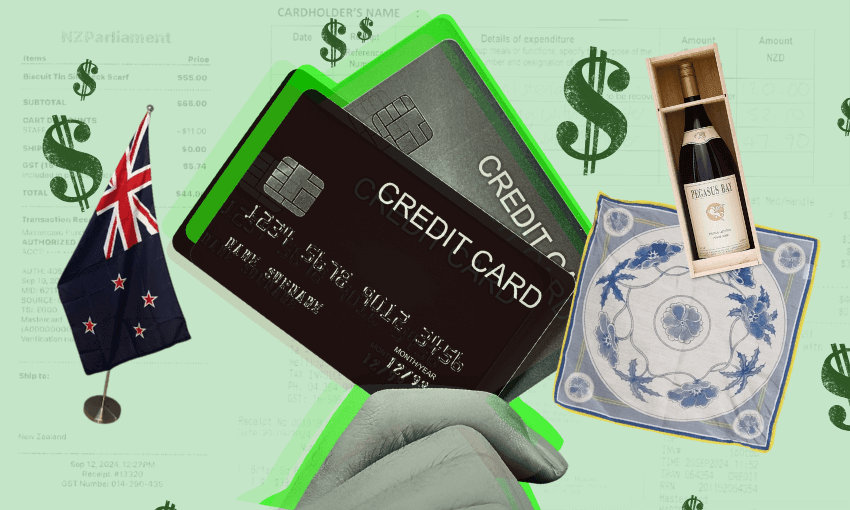We’ve crunched the numbers from the latest release of ministerial expenses to bring you this expert analysis of the most curious costs.
The quarterly release of government ministers’ credit card expenses is, on the surface, rather dull – parking, taxis, mānuka honey, All Blacks jerseys (it’s diplomacy, baby), more parking, more taxis – yet also, somehow, fascinating. Glimpsing another person’s receipts, after all, has an irresistible frisson of fiscal voyeurism about it.
And every now and then, as you trawl through gifts for foreign dignitaries and sandwiches for staffers, a line of text will jump out and beg to be examined by The Spinoff’s crack team of forensic accountants/financial auditors/arbiters of taste. Here’s a selection of curious costs from this week’s release of ministers’ expenses, covering the last three months of 2024.
Judith Collins’ phone basket: $14.90
In November, defence minister Judith Collins (or, more likely, a staffer) nabbed a bargain at Bed Bath & Table on Thorndon Quay: a half-price Claude basket, “crafted with a blend of paper rope and iron for durability, and featuring stylish wood handles for easy carrying”. While more likely designed to house half-finished tubes of hand cream, dried-up bottles of nail polish, rogue tampons, tattered hair ties and the like, this particular basket was destined for something far greater: safeguarding the nation’s security.
Attendees of meetings with the minister are instructed to chuck their phones into this dapper receptacle before entering the room, presumably in an aesthetically pleasing attempt to thwart covert recordings of proceedings and/or surreptitious attempts to play Wordle under the table.
Paul Goldsmith’s biscuit tin silk neck scarf: $44 (with staff discount)
While other ministers in need of gifts for dignitaries shop at places like “Trophy Centre” (for the large koru spirals) and “Super Liquor Rotorua” (for the super liquor), when a diplomat made a courtesy call to the justice minister’s offices in September, Paul Goldsmith simply popped down to parliament’s gift shop. It was a wise move: not only does Goldsmith get a 20% staff discount but the parliament gift shop is actually rather good, and this silk neck scarf featuring the design of the beloved member’s bill ballot biscuit tin, a modern icon purchased from Deka (RIP) in the 90s, makes for a charming pressie. (You can also get biscuit tin socks, a biscuit tin mug and this adorable biscuit tin enamel pin, if anyone’s looking to buy The Spinoff’s crack team of forensic accounts/financial auditors/arbiters of taste a gift for any reason.)
Paul Goldsmith is no stranger to the wiles of parliament’s gift shop, having purchased in 2023 a similar scarf for a visiting overseas minister, this one bedazzled with a design based on the parliamentary library’s stained glass windows.
Chris Bishop’s Parisian laundry: $358.05
While in the French capital for the Olympic Games in August, then sports minister Chris Bishop spent €75 for himself and €140.23 for staffers on hotel blanchisserie – that’s a total of NZ$358.05 on laundry. What gives, Chris and co? Didn’t pack enough undies for your week-long trip? Couldn’t resist a hoon round the purple sprint track of the Stade de France and had to wash your stinky gym gear? Took a tumble into the merde-filled Seine? Two tips for next time: 1) Les laveries are much more economical and there’s one on almost every Parisian corner. 2) Opt for more forgiving hues – this white-and-beige combo is asking for trouble when croque monsieurs are involved.
Simon Watts’ flag spreaders: $322.81
He may appear chuffed with his “woffice” (Watts + office, geddit?) in this Instagram tour from August 2024, but behind that smile, something’s bothering climate change and revenue minister Simon Watts. He gestures to the New Zealand flag in the corner of the room and the camera hovers on it for a second, before Watts moves on to his office’s various other “aspects and knickknacks”. He makes a valiant attempt to keep up the facade of jollity but, deep down, the minister knows something’s not right. It’s limp, our nation’s flag, flaccid even – you’d be forgiven for mistaking the damn thing for the Australian ensign.
Fast-forward to December and things are looking up: Watts’ flag display is lacklustre no longer and he’s positively beaming as he poses in front of it with new climate change commission chair Dame Patsy Reddy.
What’s Watts’ secret? Two words: flag spreader. If you’re not familiar, a flag spreader is a double-pronged device that attaches to a flag pole, allowing a hitherto floppy flag to be displayed as if it was caught in a brisk Wellington breeze, even when said flag is housed within the confines of the breezeless Beehive. In September, Watts purchased not one but two flag spreaders from the government’s go-to flag purveyor, Petone-based Flagmakers, at a total cost of $322.81. (Flag spreaders can be purchased online for as little as $34.95 a pop, but really, what price true patriotism?)
So why did he need two of ‘em? Double-flag display opportunities, of course, including but not limited to the signing of double tax agreements with the Republic of Slovenia.
David Seymour’s flowers: $120 (to be recovered from the minister)
Most ministers’ bills feature the odd unauthorised purchase, which they’re required to reimburse (usually the illicit spend is automatically taken out of their pay packet). In the latest batch there are heaps of contraband coffees (large flat white, sometimes one sugar, sometimes two) for Andrew Hoggard; a pint of Mac’s Gold for one poor staffer of Judith Collins (at least they didn’t have to pay back the $7 fries), and a Herald Premium subscription for Mark Mitchell (Winston Peters, meanwhile, did not have to pay back his subs to the Sydney Morning Herald, the Australian or the Times).
Then there’s David Seymour, whose expenses are brief (a couple of taxis and a suspiciously woke dinner of ramen). But in a glimpse, perhaps, of his romantic side, on August 29 the regulation minister spent $120 at Four Seasons, which the accompanying reconciliation form, listing the charge as a day earlier, says was for “flowers for a ministerial event”. The only ministerial event listed in Seymour’s official diary on August 29 is a policy forum hosted by the Employers and Manufacturers Association. Nothing says fighting red tape like flowers, especially flowers from a florist who rails against cycleways, but even anti-woke flowers aren’t considered an acceptable use of taxpayer money: the reconciliation form notes the cost was to be “recovered from the minister”.
Nicola Grigg, Todd McClay and Winston Peters: booze
In September, Nicola Grigg, minister of state for trade and investment, splashed out on a $225 magnum of Pegasus Bay pinot noir to take on her forthcoming trip to Laos as a gift, thus adding a good couple of kilos to her baggage weight. On the eve of trilateral trade talks with Australia and Fiji in Rotorua that same month, trade minister Todd McClay grabbed a $40 basket at Moore Wilson’s, then a $64 bottle of Amisfield pinot from Super Liquor Rotorua, which presumably went in the basket, maybe with some crumpled up cellophane and a few snacks he found at the back of the cupboard.
Winston Peters, meanwhile, prefers a more hands-on approach, in October spending $130 on a bottle of Cloudy Bay sauvignon blanc and two bottles of water for a “representation for visiting Portuguese ambassador” at an Auckland location whose name has been scrubbed from the records. The following day he shelled out $116.28 for six glasses of Greywacke sav for a “representation for visiting MPs from Germany” at a similarly unnamed Auckland location.
Given only 45 minutes were set aside for the meeting with Antonio Manuel Albuquerque De Vilhena Moniz, and Tilman Kuban and Nicolas Zippelius were given just a half-hour slot, this shows some serious commitment – but it’s all in a day’s work for a foreign minister as experienced as one Winston Peters. Prost and saúde to that.





